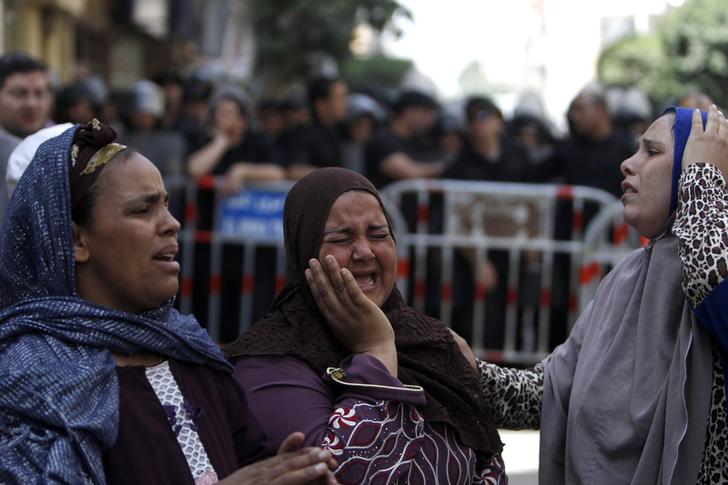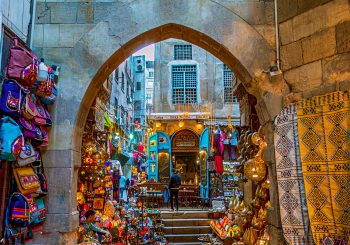By Khaled Fahmy, Aswat Masriya
About two years ago, I had a very interesting conversation with my neighbor who lives in the same apartment building in Zamalek, Cairo. I remembered this conversation today in light of the notorious verdict today by a judge in Minya sentencing 720 people to death.
My neighbor is a nice, decent man in his late sixties, and we have always had a cordial relationship with each other, despite me once causing serious damage to his apartment when a water pipe burst in my apartment flooding his just below mine.
I was rushing to some demonstration against the ministry of interior to protest against the endemic use of torture in police stations. I had my kufiyya on, and was already waving the Egyptian flag. I ran into him on the landing on the third floor.
“I see you are going again to join the Tahrir crowd. Don’t you think it is enough?” he asked half-jokingly.
“Not enough,” I replied. “Nothing has changed since we started demonstrating a year ago, and the notorious police have yet to mend their ways.”
The minute I said this, the guy’s face change, and I immediately realized my mistake. My neighbor is a retired police officer.
“You’re a good man, Dr. Khaled, but you are mistaken. The police are not that bad, we are all serving our country with our full hearts.”
“I have no doubt, sir. And of course, I have nothing but respect to you personally. But I am talking about those younger police officers who order people to be tortured as a matter of course, not even in political cases.”
“Well, let me ask you a question,” he said. “Don’t you remember when your own brother who used to live in your own apartment before you moved in – don’t you remember when his car was stolen right here from in front of the building?”
“Yes, I do remember that incident. What about it?” I replied.
“Do you remember when he got it back?”
“If I remember correctly, not before long.”
“Exactly,” he said. “And do you know how? I’ll tell you how. It is through the diligent work of the Egyptian police. Because your brother is a decent man like you, I immediately called some of my colleagues and they sprinted to action in not time, and in a matter of a few hours we managed to identify the culprit. We rounded up some suspects form the street, and encouraged them to confess in the police station,” he said with a twinkle in his eyes.
“But, sir,” I replied, “this is exactly what I am talking about. You rounded up ten innocent suspects, beat the hell out of them in the police station, and one of them confessed under torture.”
“So? What’s the problem then? Didn’t your brother get his car back? And in no time? And didn’t we succeed in catching the real culprit? What’s the problem then?”
“Sir, with all due respect, this is not a proper way to conduct an investigation. Yes, my brother got his car back, but at what cost? The police come and picked up the ten car attendants and doormen of the neighboring buildings; they then took them to the police station where they were subjected to severe beating and humiliation; one of them eventually confessed. Case closed and my brother got back his car. But what about the nine innocent guys who were beaten up for no fault of their? How do you think my brother is supposed to feel when he now knows that he is being blamed by these innocent men for something they didn’t do? Yes, my brother got his car back, but he also got with it the enmity and deep resentment of nine innocent men. And I also know what happened to these men in police custody. They were being rounded up by some basha, beaten up for something they don’t know, and the only way they could get out of this mess was to promise to be a snitch. And finally, what about the police officer who instead of conducting a proper investigation and applying what he is supposed to have learned in the police academy about criminal investigations, cuts corners, chooses the easy way out, and decides that the fastest way to resolve the case is by torturing innocent people? What kind of society is being created by resorting to torture so wantonly and so freely?”
“Oh, youth. Always idealistic and naïve.”
I didn’t want to tell him that I was nearly fifty, and that our disagreement had nothing to do with our respective ages.
Off I went to my demonstration, and he went in to his apartment.
I remembered this conversation today in light of the notorious verdict issued by a judge in Minya.
I know it is tempting to read this verdict as a politicized one; a feature of the ongoing struggle between the military-led government and the Muslim Brotherhood. The judge must have received a phone call ordering him to pass on this bizarre verdict sentencing to death 720 people in one day.
But I believe things are more complex – and more simple at the same time.
Like my police officer neighbor, I believe the judge to be a decent man. Honest, upright, and hard working. He must have sat pondering the case for hours yesterday. He believes he is protecting the country, defending basic rights, passing out heavy verdicts to people who deserve it. The country is in turmoil, he must be thinking. We have to stop this. We have to defend our nation. We have to send a strong signal that we are serious, that we are not joking. The stability of the regime and of the whole country is at stake. No compromises. No mid-way solutions. Hanging is the only deterrence, and we should not hesitate in resorting to it.
Like my neighbor, however, this judge, even if I give him the benefit of the doubt (and I have bent over backwards to do so), is in fact undermining the stability of the country while thinking that he is doing the opposite.
He may be thinking that he is sending a clear message that the Egyptian state is not to be tampered with, that it will hit back hard and swiftly at those who dare to violate its sanctity. But the only thing he actually managed to accomplish is to erode whatever faith people still have in the judiciary. How can anyone now believe in an dependent judiciary when one judge passes these draconian verdicts with such speed in complete disregard to the most basic rules of justice? These verdicts were passed without even allowing the lawyers to present their cases, and instead of pretending to do so, he actually fined them and charged them of contempt of court. Instead of being investigated or suspended, this judge is still sitting on the bench and passing one notorious verdict after another.
This is not only a travesty of justice. It is not a violation of basic legal and constitutional rights. It is a very reckless and dangerous political move. If there is a sure way to bring down the Egyptian state, it is not by attacking police stations or throwing Molotov cocktails at the presidential palace. It is by making sure that people lose whatever respect and confidence they still have in one of the main pillars of the regime, namely the judiciary. More than any one else, this judge has had a huge contribution in undermining the stability of the Egyptian state.
Khaled Fahmy is a professor and the chairman of the History department at the American University in Cairo. He studied Modern History at the University of Oxford and previously taught at New York University.
This article was provided to Egyptian Streets by Aswat Masriya.







Comments (3)
You just forgot to say that the judge final was putting 18 only to death !!!!!! Poor media
This must not happen it will most definitely have negative repercussions for Egypt. many of us love egypt and we want to keep visiting and keep brining people but if this happens It will damage the face of Egypt for a very long time.